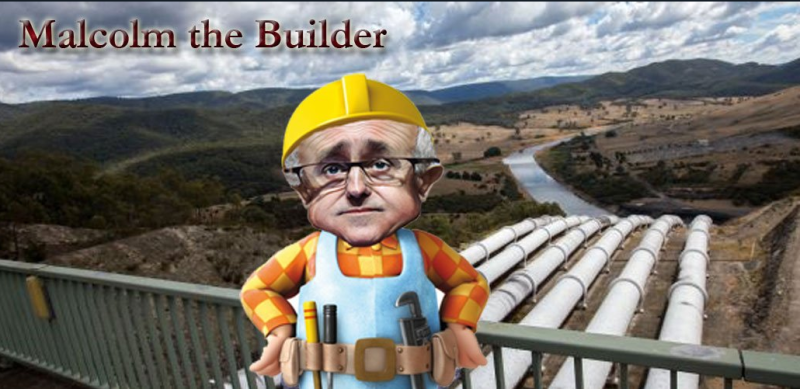'Renewable energy is currently more expensive than fossil fuel generation', according to the Coalition. Giles Parkinson analyses developments in the Turnbull Government's climate targets.
THE Turnbull Government’s draft outline of a clean energy target reportedly attempts to divorce the mechanism from emission reduction trajectories, in the latest sign of the Coalition’s commitment to coal and its attempts to put the brakes on a rapid transition to a renewables-based grid.
According to a report in The Guardian on Thursday, a draft document circulated by Minister for the Environment and Energy Frydenberg’s office to COAG energy ministers last Friday attempts to water down the already weak climate ambitions of the Finkel Review, which recommended a clean energy target (CET) be adopted.
According to The Guardian, the draft removes a key recommendation for an agreed emissions trajectory for the electricity system and even removes recommendations for subsidised solar and batteries for low-income houses.
The Finkel report itself was considered to be a sop to the climate deniers, because it took into account only the target set in place by the Abbott Government — a 26-28 per cent reduction by 2030, which is widely considered to be completely inadequate to meet the Paris goals of capping global warming “well below” 2°C.
The Finkel Review envisaged that the share of renewable energy in Australia might rise to 42 per cent by 2030 but that coal would still be supplying power as late as 2070 — decades beyond where most climate scientists consider it safe to do so.
But while the Turnbull Government has adopted 49 of the 50 Finkel recommendations, the introduction of a CET has caused a blockage, principally because it would provide no financial incentive to build new coal.
The revelations from The Guardian came as Turnbull back-tracked on comments earlier in the week about the government’s desire for a new coal-fired generator.
After saying on Monday (28 August) he had no plans to build a new coal plant, Prime Minister Turnbull told media after a meeting with utility CEOs – who all think the idea of a new coal plant is ridiculous – that the Northern Australia Infrastructure Facility may still invest in a new facility.
To highlight the pressure that Turnbull and Frydenberg are under within their own party – and the callisthenics they must produce to satisfy the hard right – Abbott insisted on Wednesday that if Turnbull were to invest in pumped hydro, then he must also invest in coal.
So it would come as no surprise if the Turnbull Administration was redoubling its efforts to find a way of allowing new coal fired generation, as a sop to the hard right and the mineral lobby.
And to do that, you would need to ignore any climate targets. It then begs the question about having a CET at all. Like the negotiations around the Carbon Pollution Reduction Scheme (CPRS) when Turnbull was leader of the Opposition, does the perfect scheme become the enemy of the good, or just the barely acceptable?
“That’s what you would expect”, said one source of The Guardian report. “Decouple energy from climate. Otherwise, coal must be out.”
Effectively, the mechanism as described in this initial document would become an "ET" rather than a CET or the RET (renewable energy target) that is due to expire in 2020.
A final document was due to be circulated to COAG chiefs on Thursday (31 August).
Another key document will be the release of two reports next week from the Australian Energy Market Operator — one its regular update on what generation will be needed in coming years in various regions. The other will be a specific document requested by the Coalition about Australia’s needs for baseload or dispatchable generation over coming years. This is also expected to look at “demand side” options that can also help guarantee security of supply.
The movements at the Federal policy level, or the lack of them, came as the Queensland LNP – which may seize power in next year’s state poll if it aligns itself with One Nation – released its renewable energy policy, which is effectively not to have one.
The document circulated at the North Queensland renewable energy forum – at the heart of a solar boom that is accounting for 40 per cent of all solar farm developments in the country – effectively abandons Labor’s 50 per cent renewable target for 2030 and does no more than required under the Federal RET.
The document also lays the blame on the high levels of renewable energy for the Statewide blackout in South Australia and describes Labor’s 50 per cent renewable energy target as “extreme”.
'Renewable energy is currently more expensive than fossil fuel generation', the document says, which is news to two of the biggest energy users in the State, Sun Metals and Telstra, which are building their own solar farms to lower their costs of energy.
It is also news to companies like Nectar Farms and the new owners of the Whyalla Steelworks, who are investing in renewable energy (100 per cent in the case of Nectar’s huge vegetable greenhouse, the largest in Australia) because it is cheaper than fossil fuels.
The LNP document commits to establishing a Cabinet Committee and a “one stop shop” for renewables and pledges to investigate and monitor the level of “intermittent” renewables in the system.
The CSIRO and the networks lobby have already made clear that anything between 30 and 50 per cent renewable energy penetration – far beyond that considered by the LNP – should be considered “trivial” to energy security. The biggest risk is likely to be network outages and coal and gas plant failures in the middle of a heat-wave.
This article was originally published in RenewEconomy and has been republished with permission. You can follow Giles on Twitter @GilesParkinson.
Monthly Donation
Single Donation
Be informed. Subscribe to IA for just $5.












